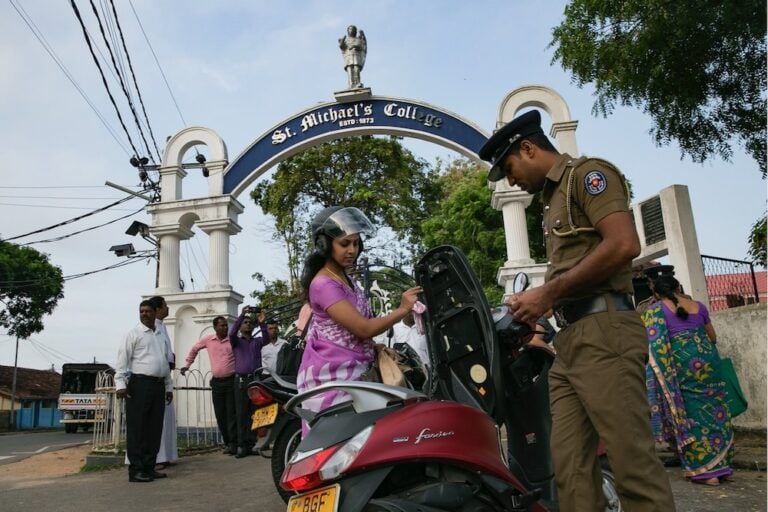(FMM/IFEX) – The following is a 10 February 2003 FMM press release: Fundamental rights petitioner punished with jail sentence by Supreme Court Last week, the Supreme Court imposed a one year prison sentence for contempt of court on a citizen who approached the court believing that his fundamental rights had been violated. The Free Media […]
(FMM/IFEX) – The following is a 10 February 2003 FMM press release:
Fundamental rights petitioner punished with jail sentence by Supreme Court
Last week, the Supreme Court imposed a one year prison sentence for contempt of court on a citizen who approached the court believing that his fundamental rights had been violated. The Free Media Movement believes this to be a human rights violation by the Supreme Court, the supposed custodian of human rights.
Michael Anthony Fernando, of Dehiwala, is the victim of this tragic episode. He is a 45 year-old English teacher and secretary of the Lakjana Human Rights Protection Organization.
Whether this petitioner’s complaint comes within the purview of fundamental rights is not our concern. He submitted a fundamental rights petition to the Supreme Court, making the chief justice and two other judges respondents in the case. The petitioner believed that his fundamental rights had been violated by the judges’ decision to join two cases with different contents. It may be that he chose to address the Supreme Court because there was no other institution he could approach in order to challenge a Supreme Court decision.
Whatever the pros and cons of filing such a fundamental rights case may be, the fact that the case was heard by a panel of judges that included the chief justice and the complainant was sentenced to one year in prison is neither correct, nor just. The complainant protested that the chief justice was included on the panel of judges appointed to hear the case. He then filed a motion requesting that the panel of judges not include anyone who was a respondent in the case. It is an accepted principle of justice that a judge cannot preside over a case in which he or she is the accused or respondent. That principle appears to have been violated by the chief justice, who not only presided over a case filed against him, but also sentenced the petitioner to one year in prison for contempt of court.
It is difficult to understand how the submission of the complainant’s petition could be seen as an insult to the judiciary. Moreover, the punishment should have been meted out in accordance with accepted legal principles. If an offence had been committed, a charge sheet should have been tabled. The accused should have been given the opportunity to defend himself and solicit a lawyer’s assistance, if necessary. In addition, the judges should have taken into consideration the fact that the accused had not committed a prior offence and that there was no possibility of appealing the punishment.
It is unfortunate that Michael Anthony Fernando was sentenced at the same time as the attorney general is drafting a law that will define contempt of court. The prime minister accepted a request by the media organisations Free Media Movement and the Editor’s Guild to define the charge so that there would be no room for unjust interpretation. The case involving Michael Anthony Fernando is not an isolated incident but is emblematic of the crisis in the judiciary, centering on the chief justice. This is also not the first fundamental rights case in which the chief justice was named a respondent.
When Magistrate Sarath Nanda Silva was appointed chief justice, three fundamental rights cases were filed. The manner in which the panel of judges was appointed to hear those cases and the manner in which the cases were heard was discussed internationally. Subsequently, two district judges filed two fundamental rights petitions, making the chief justice a respondent. The day those petitions were brought before the court, posters condemning the two judges were put up in the Supreme Court and death threats were issued against them. The teacher who was sentenced to one year in prison is therefore the chief justice’s third victim. His sentence may be seen as a punishment meant to teach a lesson to those who oppose the chief justice.
The Free Media Movement urges all human rights organisations and media organisations interested in freedom of expression to speak out in the face of such a preposterous decision and to demand that the authorities free without delay the individual who has been sent to prison. It is the duty of the president, the prime minister and the leader of the opposition to give this matter proper attention. The Free Media Movement demands that they take the necessary steps to ensure that Michael Anthony Fernando is released immediately and to create the conditions so the judiciary is trusted and respected by the people once again.
Sunanda Deshapriya
Convener
Free Media Movement


